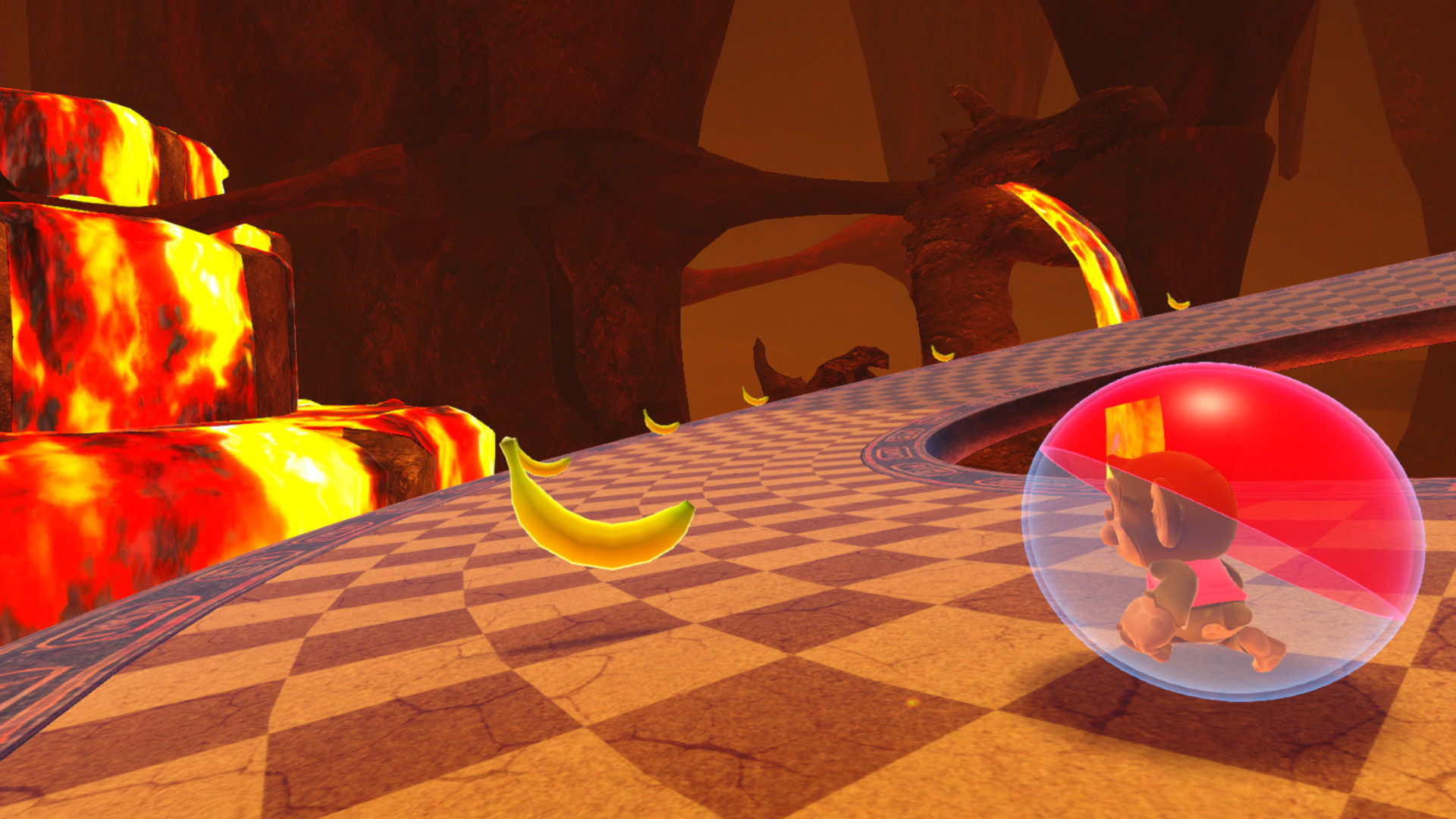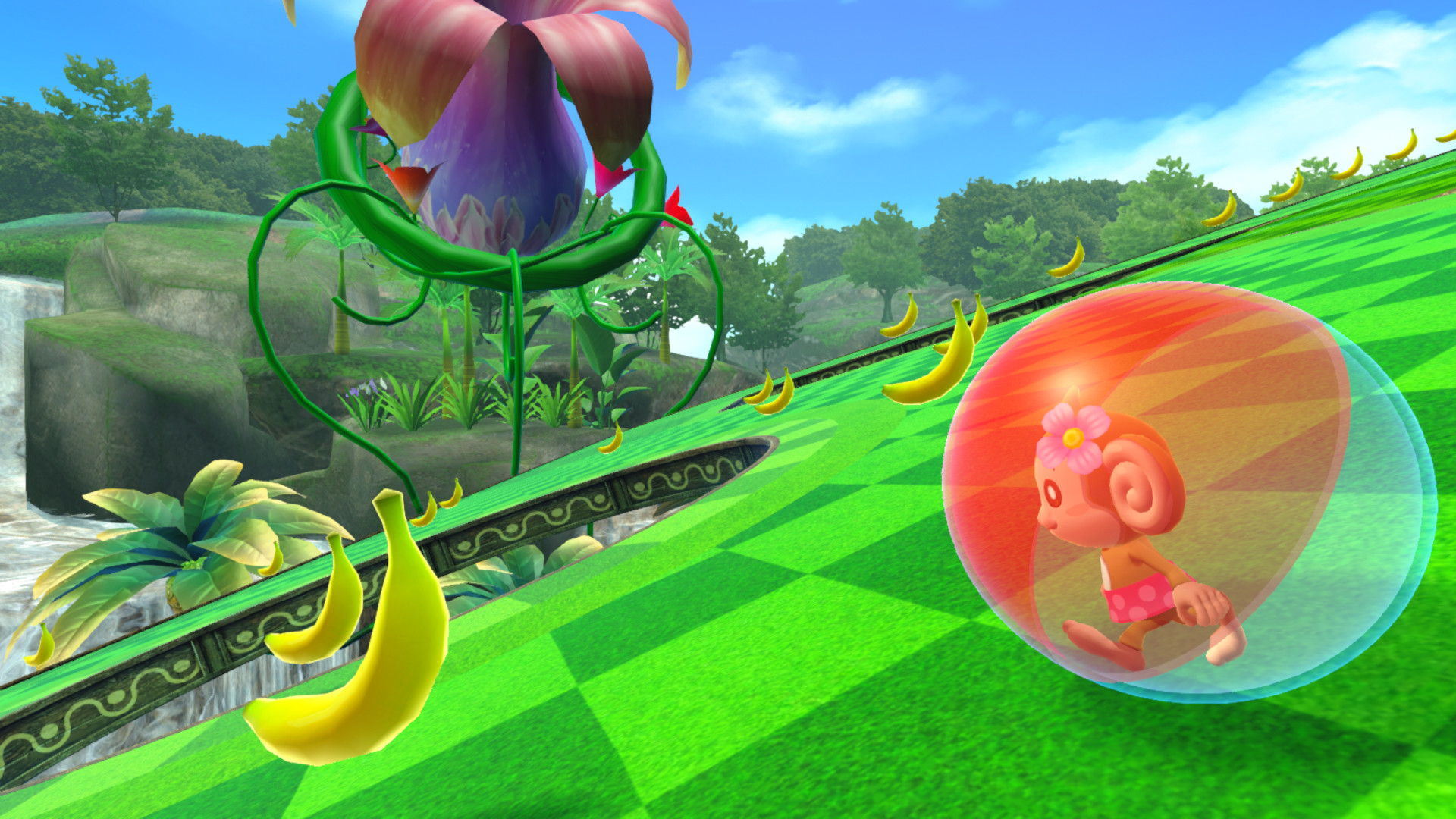Super Monkey Ball Banana Mania Review – Greatest Hits
Just in time for Super Monkey Ball’s 20th anniversary, we’re getting Banana Mania, a new entry in the series that features remastered content from the first three major console games all wrapped up in the presentation of a sort-of “best of” compilation. From its many levels, bonus characters, and multitude of party games and challenge modes, Banana Mania is quite the comprehensive package for Super Monkey Ball fans and a perfect entry point for newcomers.
There are basically two types of people. Those who like Super Monkey Ball, and those who have no idea what it is yet. It looks like Banana Mania is more-or-less trying to satisfy both with this inclusive collection of Monkey Ball levels and modes. No matter what form it takes, the delightfully goofy and approachable gameplay of the Super Monkey Ball games has always been something that anybody – who likes fun – can enjoy. It might not keep you glued to your couch for days on end, but at the very least it’s always been a good choice to burn a few hours at a time.
Banana Mania seems to know this and leans into the more successful levels and modes from across its many, many games. Because of this, fans of the series’ off-shoots like Banana Splitz might feel a bit left out, but since this game plays it a bit safer with being populated by the greatest hits, it’s still pretty hard to not have a good time with it. That crowd-pleasing approach might come at the cost of some depth, though. Some of the minigames do feel a bit overly-simplified, Monkey Target in particular seems to have lost some of its nuance in ways that are hard to describe but are definitely there.
"From its many levels, bonus characters, and multitude of party games and challenge modes, Banana Mania is quite the comprehensive package for Super Monkey Ball fans and a perfect entry point for newcomers."
Whether this was a purposeful design choice or just a by-product of Unity being used for development for the first time in the series will ultimately be irrelevant to old-school fans looking for an immaculate return of the exact same feel from the early 2000’s. That said, the differences are generally lateral ones and never really felt inherently better or worse than what I remember. It’s just a little different and perhaps a tad easier. If you take anything away from this review, let it be that despite some scaling back of technical subtleties, Banana Mania still plays great and provides a fun experience across the board.
The main game is probably where you’re going to want to jump in first. Here you’ll see several familiar worlds all containing several levels that can be played on multiple difficulties, including an assisted mode that telegraphs the safest path to the goal and lets you play in slow-motion, which doesn’t really give you that much of an advantage control-wise, as your tilting commands are also in slow-motion, but it can help in tough spots where precision is key. Although if you use this mode, you won’t be rewarded nearly as much.
Speaking of precision, newcomers might not realize the wide array of level types that Monkey Ball games can throw at them. Sure, you’ve got your linear speed-driven levels with ramps and slopes to use to your advantage, but you’ve also got a healthy dose of more technical levels with moving platforms and various hazards where accuracy is paramount. One small mistake might send you falling out of the level and starting back from the beginning, so it’s incumbent on you to change up your mindset accordingly and rise to each and every challenge. With that wide array of level types also comes a reasonably large scope of difficulty. Some levels might stump you for an hour while you completely breeze through others, but most are of course somewhere in the middle.
"Some levels might stump you for an hour while you completely breeze through others, but most are of course somewhere in the middle."
The fact that the difficulty increases aren’t always straightforward, and the game can spring surprisingly difficult and easy ones on you at seemingly any time is a nice way to keep things engaging and surprising. After so many games being released in the series at this point, I’m not shocked to see such a refined sense of pacing and variety for the game’s mainline levels, but I’m just as glad as ever that it’s here. Banana Mania is much more than just a campaign though. A fairly beefy list of party games awaits you that add some spice to the general gameplay, including kart-racing-style races, tennis, bowling, golf, target, and several others that long-time fans should recognize are represented well and are mostly fleshed out well enough to be enjoyable diversions. Bowling and racing are the standouts in my opinion ,but they’re all worth a try. They even have their own reward systems that give you more coins for doing better at them in various ways and just generally mastering their ins and outs.
You also have mission levels with specific goals and online time rankings, so between that, the beefy campaign and fairly comprehensive list of mini games, the sheer number of ways to play Monkey Ball in Banana Mania is perhaps it’s greatest strength. I also can’t continue without shouting out the assortment of customizable items that can be purchased, including shirts, hats, and even ball colors. What’s more, several characters from other notable Sega IPs are here like Sonic, Beat, and Kazuma Kiryu. All of which change the collectable bananas to objects from those characters’ worlds, i.e., Sonic collects rings, Beat collects spray paint cans, etc. Although I was a tad disappointed that you can’t customize the bonus characters the way you can the canon Monkey Ball ones, which was a letdown to discover as I really wanted to put some sunglasses and a Sega shirt on Sonic. Oh well.
As we should expect, Banana Mania looks and runs great. The timeless art direction and level design cues that made the franchise such a stand-out in arcades and home consoles 20 years ago is lovingly translated here – and it’s just as effective as it ever was. Rocking the entire level back and forth at such a brisk pace while maintaining semi-realistic physics was a formidable challenge for the GameCube and PS2, but now, clearly isn’t even remotely an issue. Running buttery smooth on PS5 is something that I’d be shocked to not see, but for what it’s worth, any graphical hitches or frame-rate drops that I might have experienced were too subtle for me to notice, so no complaints there.
"Super Monkey Ball gameplay has always reveled in its simplicity and liberal twists to the format that are introduced throughout their games. In recreating that idea with a comprehensive collection of modes and levels that worked best throughout the franchise, Super Monkey Ball: Banana Mania is largely a success."
It also helps that the musical cues are often either reminiscent of tunes from the past or fit right in with them as if they were always there. While some of the backdrops might leave a bit to be desired in terms of fancy lighting or post processing effects, the loud color schemes of Monkey Ball’s various worlds and landscapes still pop nicely and that is the most important thing. The bouncy melodies of Monkey Ball games never really were much to write home about on their own, but still fit the wacky visuals perfectly, so it’s nice to see the soundtrack treated with equal respect here.
Super Monkey Ball gameplay has always reveled in its simplicity and liberal twists to the format that are introduced throughout their games. In recreating that idea with a comprehensive collection of modes and levels that worked best throughout the franchise, Super Monkey Ball: Banana Mania is largely a success. While notable, it’s hard to get too hung up on some of the more subtle drawbacks with simplified physics and some of the franchise’s more unique ideas not being represented. Ultimately, Banana Mania might be a bit more aimed at newcomers than returning fans, but given its smorgasbord of modes, levels, and thoughtful touches here and there, you’d be hard-pressed to not have a good time with it.
This game was reviewed on the PlayStation 5.
* This article was originally published here


Comments